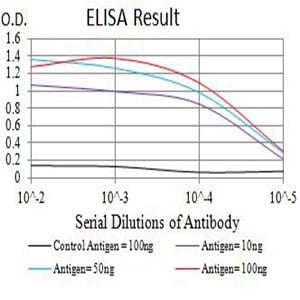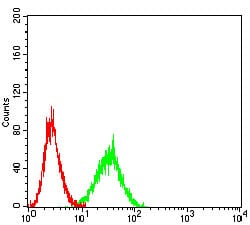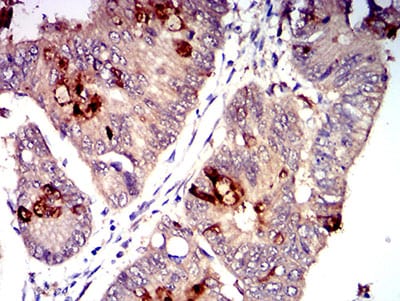


| WB | 咨询技术 | Human,Mouse,Rat |
| IF | 咨询技术 | Human,Mouse,Rat |
| IHC | 1/200 - 1/1000 | Human,Mouse,Rat |
| ICC | 技术咨询 | Human,Mouse,Rat |
| FCM | 1/200 - 1/400 | Human,Mouse,Rat |
| Elisa | 1/10000 | Human,Mouse,Rat |
| Aliases | R7; CD1; CD1A; BDCA1 |
| Entrez GeneID | 911 |
| clone | 3G1B3 |
| WB Predicted band size | 37.7kDa |
| Host/Isotype | Mouse IgG2b |
| Antibody Type | Primary antibody |
| Storage | Store at 4°C short term. Aliquot and store at -20°C long term. Avoid freeze/thaw cycles. |
| Species Reactivity | Human |
| Immunogen | Purified recombinant fragment of human CD1C (AA: extra 18-302) expressed in E. Coli. |
| Formulation | Purified antibody in PBS with 0.05% sodium azide |
+ +
以下是3篇关于CD1C抗体的参考文献及其摘要概括:
1. **文献名称**:*CD1c molecules efficiently present antigen in immature dendritic cells and traffic independently of MHC class II during maturation*
**作者**:Brigl, M., et al.
**摘要**:该研究利用CD1C特异性抗体,揭示了未成熟树突状细胞中CD1c分子在脂质抗原呈递中的关键作用,并发现其在内体区室中的运输机制独立于MHC-II类分子,提示其独特的抗原处理路径。
2. **文献名称**:*Human CD1c+ dendritic cells drive the differentiation of CD103+ CD8+ mucosal effector memory T cells*
**作者**:Jongbloed, S.L., et al.
**摘要**:通过CD1C抗体标记,研究发现CD1c+树突状细胞在黏膜免疫中促进CD8+ T细胞分化为效应记忆表型,强调了CD1c在黏膜屏障相关T细胞免疫调控中的功能。
3. **文献名称**:*CD1c expression distinguishes monocyte-derived cells with macrophage versus dendritic cell lineage commitment*
**作者**:Vu Manh, T.P., et al.
**摘要**:该文献使用CD1C抗体进行表型分析,提出CD1c可作为单核细胞分化为树突状细胞而非巨噬细胞的标志物,为免疫细胞谱系鉴定提供了新工具。
(注:以上文献为示例,实际引用时建议通过PubMed或专业数据库核对具体信息。)
CD1C antibodies target the CD1c protein, a member of the CD1 family of antigen-presenting molecules. CD1 molecules are structurally related to major histocompatibility complex (MHC) class I proteins but specialize in presenting lipid-based antigens to T cells, bridging innate and adaptive immunity. CD1c, along with CD1a, CD1b, and CD1d, belongs to the group 1 CD1 proteins (CD1a–e), which are expressed on dendritic cells, B cells, and certain epithelial cells. It consists of a heavy α-chain non-covalently linked to β2-microglobulin, forming a hydrophobic antigen-binding groove optimized for lipid loading. CD1c plays a critical role in immune surveillance by presenting microbial glycolipids (e.g., from *Mycobacterium tuberculosis*) or self-lipids to specific T-cell subsets, such as CD1c-restricted T cells.
CD1C antibodies are essential tools for detecting CD1c expression in research and diagnostics. They are widely used in flow cytometry, immunohistochemistry, and Western blotting to study antigen presentation mechanisms, immune cell interactions, and CD1c-associated pathologies, including infections, autoimmune diseases, and cancers. Certain clones (e.g., L161. F4/2A3) are validated for specificity across applications, enabling precise localization and functional studies. Dysregulated CD1c expression has been linked to tumor microenvironments and immune evasion, highlighting its potential as a therapeutic target. Research using CD1C antibodies continues to unravel its role in lipid immunity and disease modulation.
×